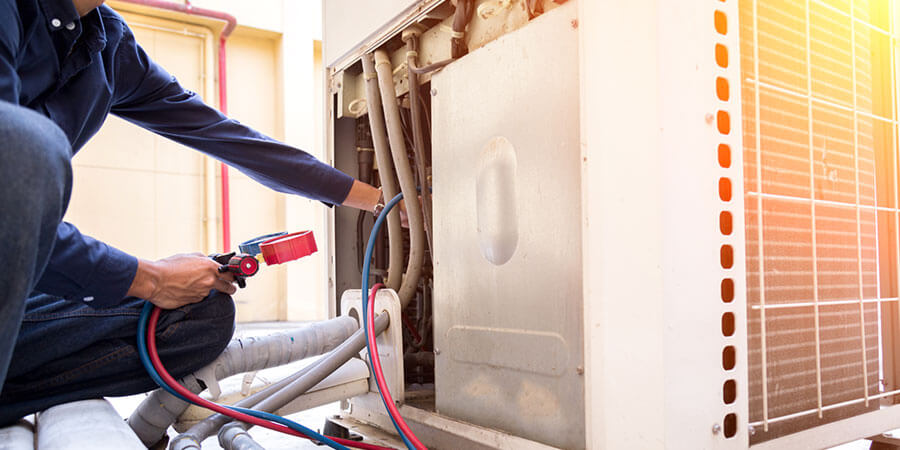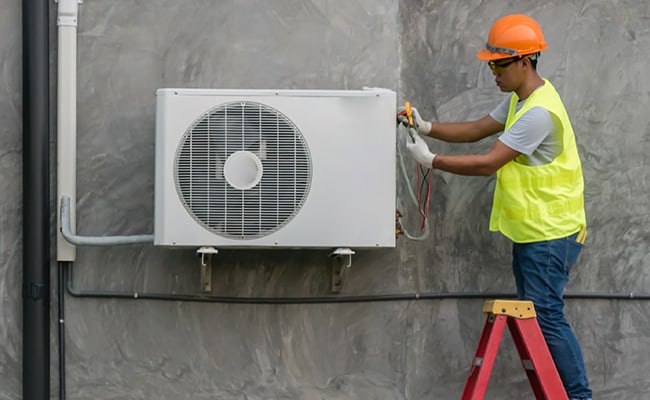Top Reasons to Schedule heat pump replacement ooltewah tn
Top Reasons to Schedule heat pump replacement ooltewah tn
Blog Article
Choosing Between a Heatpump and Furnace: Trick Factors To Consider for Your HVAC Needs
When evaluating home heating choices for HVAC needs, the choice in between a warm pump and a furnace can be intricate. Each system offers distinctive benefits tailored to specific environments and power efficiency goals. Understanding these distinctions is important for making an educated choice. Trick aspects such as installment costs and ecological effect additionally complicate the option process. Which alternative truly straightens with one's convenience and sustainability preferences? The adhering to sections will certainly check out these factors to consider in detail.
Recognizing Warmth Pumps: How They Work and Their Advantages
While many property owners take into consideration different home heating choices, comprehending how warm pumps feature and their advantages can substantially influence their choice. Heatpump run by transferring heat instead than generating it. In the wintertime, they remove warm from the outdoors air or ground and move it indoors, while in the summertime, they reverse this procedure, cooling down the home by eliminating heat outside. This double functionality makes them flexible for year-round environment control.One of the key benefits of warmth pumps is their power performance. They use significantly less power compared to typical furnace, possibly leading to lower utility costs (heat pump replacement ooltewah tn). In addition, heatpump have a smaller sized carbon footprint, making them an eco-friendly option. They likewise need less upkeep than standard systems, adding to long-term price financial savings. In general, understanding the technicians and advantages of warm pumps can aid property owners make notified decisions regarding their heating and cooling requirements
Discovering Heaters: Kinds, Procedure, and Advantages
Heating systems can be found in different kinds, consisting of gas, electrical, and oil designs, each with distinct functional mechanisms. Comprehending these distinctions is necessary, as they impact effectiveness and heating performance. In addition, heaters offer countless advantages, such as regular warm result and reliability in chillier climates.
Kinds of Heating systems
Heating systems can vary significantly in style and operation, with heaters being a preferred option among home owners. There are a number of sorts of heating systems, each using various fuel resources and innovations. Gas furnaces prevail, leveraging natural gas to generate warm efficiently. Electric heaters, on the other hand, make use of electric resistance to create warmth, often favored for their uncomplicated setup. Oil heaters, while less usual, work in locations with limited gas accessibility (heat pump replacement ooltewah tn). Furthermore, condensing heaters optimize energy effectiveness by reusing and capturing exhaust gases. Each type operates with a system of warm exchangers and ductwork to distribute cozy air throughout a home. Understanding the distinctions in between these heating system kinds is important for notified cooling and heating decisions
Advantages of Heating systems
For home owners seeking reputable heat throughout chilly months, the benefits of heaters are considerable. Heaters give regular home heating, making sure also temperature levels throughout the home. They are especially reliable in extreme cold, commonly outperforming heatpump in freezing conditions. Numerous types, including gas, electrical, and oil heaters, offer adaptability to fulfill diverse requirements and preferences.Furnaces additionally tend to have reduced initial setup costs contrasted to heat pumps, making them a more available choice for numerous. Their robust design adds to a much longer life expectancy, with numerous units lasting over 15 years with appropriate maintenance. In addition, modern-day heating systems are commonly equipped with innovative modern technology for boosted performance, which can bring about minimized power costs. On the whole, heaters continue to be a dependable choice for reliable home heating.

Power Efficiency: Comparing Heat Pumps and Furnaces
When contrasting energy effectiveness in between heatpump and heaters, the Seasonal Energy Effectiveness Proportion (SEER) plays a crucial duty in determining performance. In addition, a functional cost analysis exposes the long-term monetary effects of each system. Understanding these elements can guide house owners in making educated choices about their heating remedies.
Seasonal Power Efficiency Proportion
Energy efficiency plays a vital function in the decision-making procedure in between heatpump and furnaces, especially when taking into consideration the Seasonal Energy Performance Proportion (SEER) This metric actions the cooling efficiency of heat pumps over an entire cooling period, offering a standard method to review performance. Higher SEER ratings suggest greater power efficiency, translating to reduced power intake and reduced utility bills. On the other hand, furnaces are normally assessed using the Annual Fuel Use Effectiveness (AFUE) score, which shows heating efficiency. When comparing these two systems, property owners must focus on SEER scores for warm pumps, as they directly impact overall power cost savings and environmental sustainability. A detailed understanding of SEER can notably influence the long-term satisfaction and cost-effectiveness of the picked HVAC solution.
Functional Cost Analysis
Understanding the operational prices connected with warm pumps and furnaces is essential for house owners evaluating their alternatives. Heatpump usually provide greater energy efficiency, transforming electrical power right into heat with minimal waste. This leads to lower regular monthly utility expenses, particularly in moderate environments. Alternatively, conventional heating systems, especially gas versions, may have lower upfront costs however can sustain greater functional expenses with time because of sustain prices and performance ratings.Moreover, warm pumps can function as both home heating and cooling systems, possibly minimizing the demand for different cooling and heating systems. While preliminary investments for warm pumps might be higher, their lasting savings in energy performance can make them a more economical choice for many households. Careful evaluation of neighborhood power prices is important to identify the very best option.
Setup Prices: What to Anticipate for every Furnace
Installment expenses for home heating systems can differ considerably between warm pumps and heaters, influencing property owners' choices. Heat pumps generally have higher upfront setup costs, usually varying from $3,500 to $8,000, depending on the unit size and intricacy of setup. This includes the outside system, indoor handling system, and needed ductwork alterations. Alternatively, heaters tend to have reduced first expenses, balancing in between $2,500 and $6,000, which can be appealing for budget-conscious home owners. However, installment expenses can raise if comprehensive ductwork is required.Moreover, the choice of fuel kind for heaters-- all-natural gas, lp, or electrical-- can also affect setup costs. While heatpump provide energy performance, their preliminary financial investment may deter some customers. Inevitably, evaluating installation expenses alongside lasting financial savings and effectiveness will certainly assist property owners in making informed choices concerning their heater.
Environment Considerations: Which System Performs Much Better in Your Area
How do environment conditions influence the performance of heating unit? The efficiency of heatpump and furnaces can differ significantly relying on the neighborhood environment. In moderate climates, warmth pumps succeed by effectively moving warm from the outside air, making them an energy-saving choice. Their effectiveness lessens in incredibly cool temperature levels, where they might battle to extract adequate warmth. On the other hand, heaters, specifically gas models, find more offer regular and trusted warmth despite outside problems, making them preferable in chillier regions.In areas that experience milder wintertimes, heat pumps can run properly year-round, providing both heating and air conditioning. On the other hand, areas with rough winter seasons usually gain from the toughness of heaters. Inevitably, comprehending the local environment is important when determining between a heatpump and a heating system, as it directly affects their functional performance and total efficiency.
Upkeep Demands: Long-Term Treatment for Warm Pumps vs. Furnaces
While both heat pumps and furnaces call for regular upkeep to ensure peak performance, their particular needs and treatment routines vary substantially. Heating systems normally need less frequent focus, with annual index inspections sufficing to examine for gas leakages, clean filters, and examine overall functionality. Their less complex layout usually enables uncomplicated repairs.In contrast, warm pumps demand semiannual upkeep because of their dual duty in cooling and heating. This includes cleaning coils, inspecting cooling agent levels, and making sure that both the interior and exterior systems function at their ideal. Furthermore, warmth pump upkeep usually includes even more complex components, making professional maintenance essential.Neglecting upkeep can result in reduced performance and increased power prices for both systems. Inevitably, house owners ought to take into consideration these long-term treatment demands when picking in between a heat pump and a furnace, as aggressive upkeep can prolong the life-span and performance of either system considerably.
Ecological Impact: Picking a Sustainable Home Heating Choice
The environmental influence of furnace is an essential evaluation for home owners seeking lasting options. Warm pumps are normally a lot more energy-efficient than typical furnaces, as they move heat as opposed to produce it, significantly reducing carbon discharges. By utilizing renewable resource resources, such as air-source or geothermal warmth pumps, home owners can further minimize their environmental footprint.On the other hand, gas furnaces release greenhouse gases and add to air pollution, though they usually provide higher warmth result. Innovations in modern technology have actually led to the advancement of high-efficiency heaters that decrease emissions.Ultimately, picking a heating system includes evaluating performance against environmental impact. Homeowners are motivated to assess local energy resources and motivations for eco-friendly systems, making sure a choice that straightens with both personal convenience and ecological responsibility. The choice influences not only prompt convenience however additionally long-lasting sustainability and ecological health.
Regularly Asked Questions
For How Long Do Heat Pumps and Furnaces Generally Last?
The life-span of heat pumps generally varies from 15 to two decades, while heating systems can last in between 15 to thirty years. Normal upkeep significantly influences their longevity and effectiveness in offering home heating options.
Can I Make Use Of a Heatpump in Very Cold Climates?
Heatpump can operate in exceptionally cold environments, but their effectiveness diminishes as temperature levels drop. In such problems, extra heating resources might be needed to maintain comfortable interior temperatures and ensure peak efficiency.

What Is the Sound Level of Heat Pumps Versus Furnaces?
The sound degrees of heatpump and furnaces differ substantially. Normally, heatpump operate even more silently than traditional heaters, making them more effective for those sensitive to appear, while heaters may produce louder functional sounds throughout heating cycles.
Are Warmth Pumps Suitable for Both Cooling And Heating?
Heatpump are certainly suitable for both heating & cooling (heat pump installation ooltewah tn). They operate by transferring heat, giving effective temperature level control year-round, making them a flexible selection for house owners seeking an all-in-one heating and cooling option
What Size Heater Do I Required for My Home?
Figuring out the ideal size heating system for a home calls for examining factors such as square video footage, insulation quality, neighborhood climate, and the home's design. Consulting a professional can ensure an accurate assessment and optimal convenience. Heat pumps commonly provide greater power efficiency, transforming electrical power into heat with marginal waste. In moderate climates, warm pumps excel by effectively moving heat from the outdoors air, making them an energy-saving alternative. Conversely, heating systems, particularly gas designs, supply regular and reputable warmth no matter of over here exterior conditions, making them more effective in cooler regions.In locations that experience milder winters months, warmth pumps can run successfully year-round, offering both heating and cooling. Heat pumps are typically much more energy-efficient than traditional furnaces, as they transfer warm instead than generate it, significantly lowering carbon exhausts. By utilizing sustainable power resources, such as geothermal or air-source heat pumps, property owners can even more minimize their eco-friendly footprint.On the various other hand, natural gas furnaces discharge greenhouse gases and add to air pollution, though they often supply higher warmth outcome.
Report this page